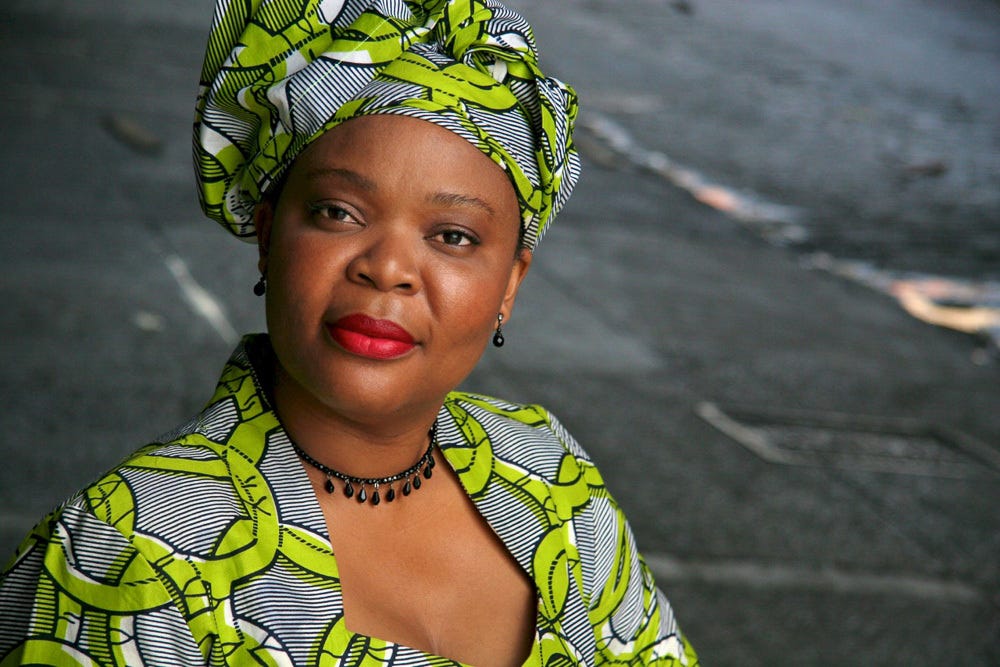The Profile Dossier Classic: Leymah Gbowee, The Peace Activist Who Ended a 14-Year Civil War
The Profile Dossier Classic: Leymah Gbowee, The Peace Activist Who Ended a 14-Year Civil War"You can never leave footprints that last if you're always walking on your tiptoes."Good morning, friends! To celebrate International Women’s Day, I want to re-share my Profile Dossier on Leymah Gbowee, an activist who helped end a 14-year civil war in Liberia by uniting women in a movement that advocated for peace. With everything I do, I always think about her quote: “The smallest action can have a ripple effect, inspiring others and shifting the world around you ever so slightly. And once you get your footing, maybe then you can move on to loftier pursuits.” Leymah Gbowee was 17 years old the first time she saw a dead body. She was so traumatized that she froze. And then life as she knew it turned upside down. "By 31 [years old], it was a natural occurrence for me, and no group of people should live like that," she says. In 1989, General Charles Taylor led an armed uprising against the government of President Samuel Doe. Following Doe's execution, Taylor gained control of a large portion of the country and became one of the most prominent warlords in Africa until he was elected president. Death and gruesome killings became the norm during his presidency. Rebel groups popped up across the country, and a bloody civil war erupted in which the citizens — many of them women and children — were brutalized, raped, and killed in the warlords' path of terror. The war, which lasted from 1989 to 2003, led to the death of close to 250,000 people. At the time, Gbowee was a social worker counseling women who had been raped by soldiers, and children who had seen their parents murdered. One night, she had a dream that God spoke to her, saying, “Gather the women and pray for peace!” She began recruiting women in markets, churches, and mosques, and uniting Christian and Muslim women in a single movement that would pray for peace. As the war began closing in, the women understood that meeting with church leaders and praying wouldn't be enough. They needed to stage a protest that would involve some unusual tactics, including a country-wide sex strike. A total of 2,500 women tied their hair, took off their jewelry, wore plain white clothes, and took to the streets. "It was the first time in our history of Liberia where Christian women and Muslim women were coming together," Gbowee says. "And we had a big banner that said, 'The women of Liberia want peace now.'" Day after day, week after week, the women protested outside of Taylor's office but he repeatedly ignored their request to hear their demands. By April of 2003, the movement had grown so large and so loud that Taylor could no longer ignore them, leading him to finally arrange for a meeting. As the representative of the women's movement, Gbowee presented the following message to Taylor: "The women of Liberia are tired of war. We are tired of running. We are tired of begging for bulgar wheat. We are tired of our children being raped. We are now taking this stand to secure the future of our children." Then, the women turned their sights to the rebels and managed to get them to agree to engage in regional peace talks with Taylor that took place in Accra, Ghana. When the peace talks stalled, Gbowee led a delegation of women protesters to Accra, while a full-scale war broke out in the capital of Liberia. Two hundred women looped arms around the entrance of the conference hall where talks were taking place and refused to leave until a peace agreement had been signed. "We're going to keep them in that room without water, without food, so that they at least feel what the ordinary people in Liberia are feeling at this particular point in time,” she said. Security guards came up to Gbowee and told her that she would be arrested for obstructing justice. "I just went wild," she says. Gbowee began to undress because in a traditional African context, this act would have been seen as a humiliation for the male delegates. "I told them, 'I'm going to strip naked,'" Gbowee says. The parties returned to the bargaining table and reached a peace agreement. By August of 2003, Taylor was exiled to Nigeria and international peacekeeping troops arrived in Liberia. Gbowee and the women didn't stop — they continued advocating for peace to make sure the transitional government executed the peace agreement properly. Fourteen years of war and terror had finally come to an end. "Peace is a process, it's not an event," Gbowee said at the time. "When the guns are put down, we have to continue to build the peace. We believed that until we had elected democracy, Liberia would not know true peace." When it was time to vote, the women rose up and made Liberia the first nation in Africa to elect a female president. In her speech, Liberia's President Ellen Johnson Sirleaf said, "It is the women who labored and advocated for peace throughout our region." In this deep-dive, we'll learn how Gbowee's nonviolent movement led her to mobilize an entire nation of women, hold leaders accountable, and help heal the wounds of war. One person's dream for a better life can start small and ultimately spark a revolution. She says, "I think there is a moment in everyone’s life — we all have it — when you’re pushed so far back against the wall, you have two options: allow that wall to swallow you or fight back." READ.On turning hopelessness into empowerment: In her memoir, Mighty Be Our Powers, Gbowee explains how she found the strength to turn her depression and bitterness into positive action. She details her struggles, including ones of addiction, domestic abuse, and difficult relationships with family. As one reader put it: "Leymah Gbowee has come as close as it is humanly possible to staring the devil in his face. She didn't blink, lived to tell about it, and is now the co-recipient of the 2011 Nobel Peace Prize." LISTEN.On standing up to the warlords: During the nonviolent movement, the women used some unusual tactics to fight Liberia's warlords. One of them was a sex strike, effectively denying sex to men. "In the rural areas it was really, really successful because the women they had smaller communities, they were able to stay together and be together so they were together for like months at night, keeping vigils, praying together," she says. "So they could keep it on for a much longer time. But for us in the urban area, it was quite difficult." On the psychology of activism: As a young mother trapped in a situation of domestic abuse, Gbowee found the courage to turn her bitterness into action, realizing that it is women who suffer most during conflicts—and that the power of women working together can create an unstoppable force. In this conversation, she says, "We had come to a place where we were not certain of tomorrow. We as mothers decided to put our broken bodies out there and protest for peace." WATCH.On her relentless fight for peace: This documentary details the remarkable story of how the women of Liberia came together to end the country's bloody civil war. Gbowee led the nonviolent movement and brought together Christian and Muslim women to play a pivotal role in ending Liberia’s devastating, 14-year civil war in 2003. This is a must-watch. On peacemaking as a process: In this commencement speech, Gbowee explains that peacemaking is a process, not an event. She says peace-building is all about “small steps and small victories.” Ending violence and conflict may take days, years, and even generations, but taking the first step will always be worth it. On finding hope: In this video, Gbowee paints a dire picture. In Liberia, the teenage pregnancy rate is three to every 10 girls. Teen prostitution is at its peak. Girls as young as 12 are being prostituted for less than a dollar a night. So, someone asked her, where is the hope? Watch this talk to hear her powerful answer. POLINA'S TAKEAWAYS.Adopt a learner's mentality: During a Q&A, a Nigeria-born Columbia University student asked Gbowee how Africans educated in the West could create meaningful change in their native countries if they were to return. “Please do not adopt a mentality that ‘We are going back to save them,’” Gbowee said. “Look at me. Even with your Columbia education, can you save me? Honestly? Child, don’t try it when you go to Nigeria." It takes time to earn trust, build credibility, and truly understand the needs of the people who live there every day. "Go with an attitude of wanting to learn, wanting to serve, and not that ‘I’ve lived in New York and I come back with a Columbia education,’" she says. "Or you will come running back to the U.S." True leadership, Gbowee says, is empowering others rather than hoarding the power yourself. Understand that a single person can spark a revolution: Creating meaningful change can start on the smallest level. To find your purpose, Gbowee recommends asking yourself: "What is the thing that keeps me up at night and makes me angry at the same time? When you figure this out, no hurdle will be insurmountable. “Start small, bite off what you can chew,” she says. "The smallest action can have a ripple effect, inspiring others and shifting the world around you ever so slightly. And once you get your footing, maybe then you can move on to loftier pursuits.” Remember, one voice can be more powerful than all the money in the world. Break down socially-constructed walls: How do wars happen? How do enemies get created? How do neighbors turn on one another? Through socially constructed walls. “When we are persistently told that someone from this group is evil and you act on it, you build a wall between you and that person,” Gbowee said. “Eventually you do not see the individual; you see a thing. And because you are looking at a thing you are able to harm them and treat them in whatever way you want.” When you get to know someone as a human being, it's harder to hate them or harm them. She knew that she had to chip away at those walls — like the one that separated the Catholic and Muslim women in Liberia. Oppressive governments exist because of their ability to instill fear and build walls between their citizens. “Fear has taken over our world," she says. "All of the joys we experience as people are being taken away from us gradually.” What walls stand between you and living a life of peace and calm? Breaking chains through forgiveness: Gbowee believes that we will stay forever chained to the people who hurt us only if we can't forgive them. When someone offends you and you've been unable to let go, the thought of them could drive you to dream of revenge. “The person who hurt you — who raped you or killed your family — is also here," she writes in her memoir. "If you are still angry at that person, if you haven't been able to forgive, you are chained to him." She encourages readers to picture themselves standing before the "Mountain of Peace and Prosperity" as a final destination. But every time we try to climb that hill, the person we haven't forgotten weighs us down. "It's a personal choice whether or not to let go. No one can tell you how long to mourn a death or rage over a rape," she says. "But you can't move forward until you break that chain.” Forgiveness, she adds, is the only tool strong enough to break that chain. QUOTES TO REMEMBER."You can never leave footprints that last if you're always walking on your tiptoes." "When the powerless start to see that they really can make a difference, nothing can quench the fire." "There is something in this world that every individual can do." "It's time for women to stop being politely angry." "The one thing I have never been afraid of is standing before important people and speaking my mind." "Refuse to be in the shadows as you step out into this life." "It is our duty to stand up for humanity — step in and correct things that are wrong." “Live with integrity. Embrace strangers. Refuse to walk on tiptoes. Walk loudly, leaving an impact on our world. Building peace in a war-making world is not difficult. It takes heart.” … Want more deep dives of interesting people? Sign up for The Profile here:✨ Pre-order my new book, HIDDEN GENIUS below: |
Older messages
The Profile: The original king of crypto & the firm that ‘erases your past’ from the internet
Sunday, March 5, 2023
This edition of The Profile features Arthur Hayes, Madison Campbell, and Amaryllis Fox.
The Profile Dossier: Amaryllis Fox, the ex-CIA agent performing the most clandestine operations
Wednesday, March 1, 2023
"The only real way to disarm your enemy is to listen to them."
The Profile: The big bank CEO moonlighting as a D.J. & the ‘crypto pragmatist’
Sunday, February 26, 2023
This edition of The Profile features Joe Montana, David Solomon, Alexis Ohanian, and more.
The Profile Dossier: Phil Stutz, the Therapist Offering Practical Tools to Help You Navigate Life
Wednesday, February 22, 2023
"The highest creative expression for a human being is to be able to create something new right in the face of adversity."
The Profile: The woman helping the world’s most powerful navigate crisis
Sunday, February 19, 2023
This week's edition of The Profile features Risa Heller, Nic Askew, Stefon Diggs, Rebecca Black, and more.
You Might Also Like
From 0 to $1.1B (+ growth model)
Thursday, March 6, 2025
I love that you're part of my network. Let's make 2025 epic!! I appreciate you :) Today's hack From 0 to $1.1B (+ growth model) In 2012, a developer from Ukraine, Dmitriy Zaporozhets - co-
Topic 30: Everything You Need to Know about Knowledge Distillation
Wednesday, March 5, 2025
This is one of the hottest topics thanks to DeepSeek. Learn with us: the core idea, its types, scaling laws, real-world cases and useful resources to dive deeper
😎 Bustin' out budget benchmarks
Wednesday, March 5, 2025
Benchmark data by industry plus free budget templates View in browser Masters in Marketing You know that riddle that goes around the tubes now and then? “The poor have it. The rich need it. And if you
🦅 I should've done this sooner
Wednesday, March 5, 2025
Experimenting is good. Working with people that know there stuff is better | Practical ways to convert leads through cold outreach
$120k/Year with a small audience?
Wednesday, March 5, 2025
If you're wondering how to build a thriving business while staying authentic and leveraging the power of SEO and YouTube... ͏ ͏ ͏ ͏ ͏ ͏ ͏ ͏ ͏ ͏ ͏ ͏ ͏ ͏ ͏ ͏ ͏ ͏ ͏ ͏ ͏ ͏ ͏ ͏ ͏ ͏ ͏ ͏ ͏ ͏ ͏ ͏ ͏ ͏ ͏ ͏ ͏
Founder Weekly - Issue 675
Wednesday, March 5, 2025
March 05, 2025 | Read Online Founder Weekly (Issue 675 March 5 2025) Welcome to issue 675 of Founder Weekly. Let's get straight to the links this week. Mr. Wonderful Lost Out on $400 Million… Will
How advertisers unlock measurable outcomes for performance-based campaigns
Wednesday, March 5, 2025
Scaling performance advertising beyond search and social
Your Practical Path to Marketing Automation
Wednesday, March 5, 2025
Today's Guide to the Marketing Jungle from Social Media Examiner... presented by social-media-marketing-world-logo We're halfway through the week, Reader, how's your marketing strategy
Maybe We Are Getting A Bitcoin-Only Strategic Reserve After All
Wednesday, March 5, 2025
Listen now (3 mins) | Today's letter is brought to you by Osprey Funds! ͏ ͏ ͏ ͏ ͏ ͏ ͏ ͏ ͏ ͏ ͏ ͏ ͏ ͏ ͏ ͏ ͏ ͏ ͏ ͏ ͏ ͏ ͏ ͏ ͏ ͏ ͏ ͏ ͏ ͏ ͏ ͏ ͏ ͏ ͏ ͏ ͏ ͏ ͏ ͏ ͏ ͏ ͏ ͏ ͏ ͏ ͏ ͏ ͏ ͏ ͏ ͏ ͏ ͏ ͏ ͏ ͏ ͏ ͏ ͏ ͏ ͏ ͏
🕵️♂️ The “Write to Your Former Self” Growth Hack
Wednesday, March 5, 2025
PLUS A referral growth loop that fuels itself and a funnel that actually converts.


